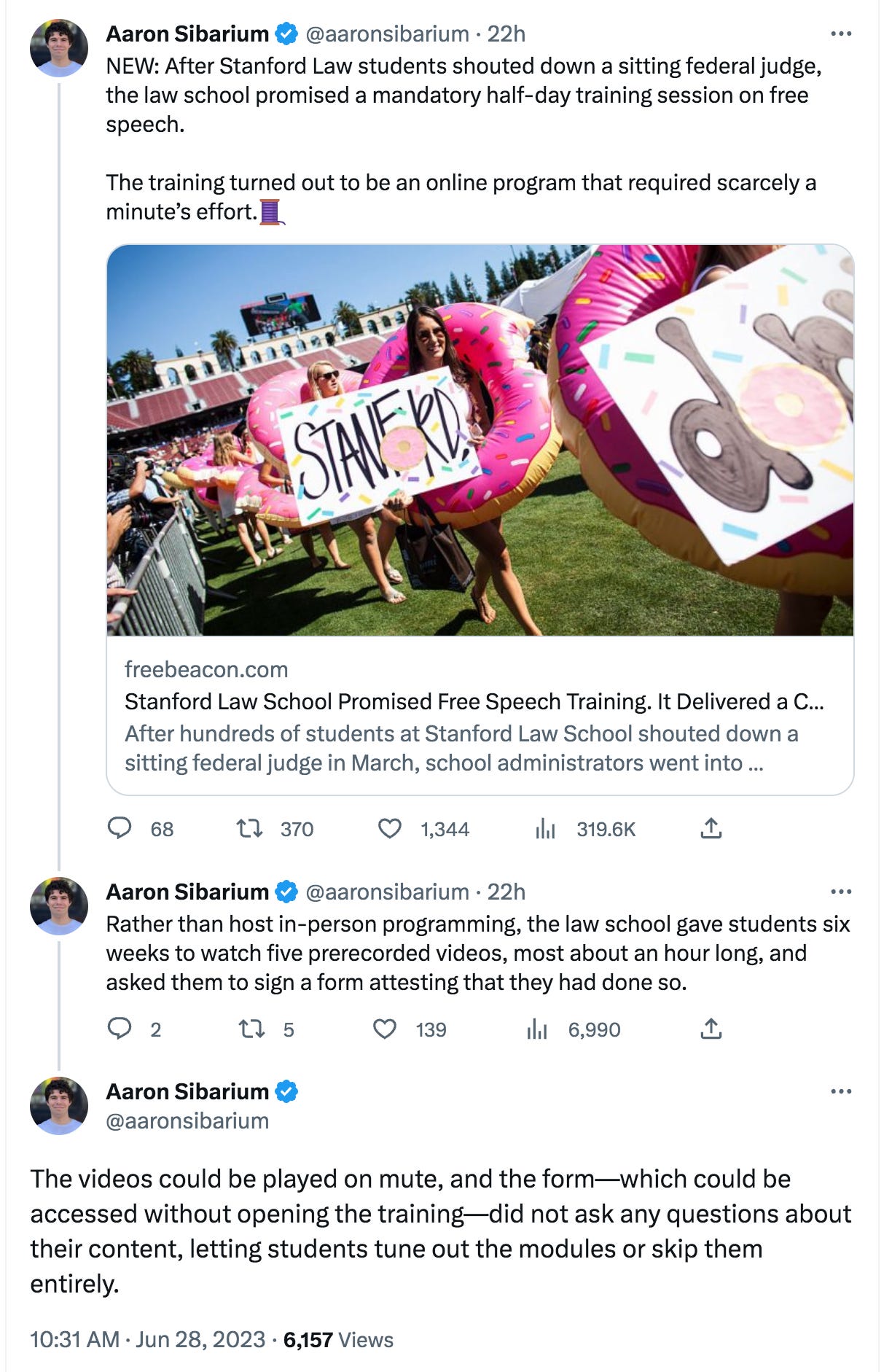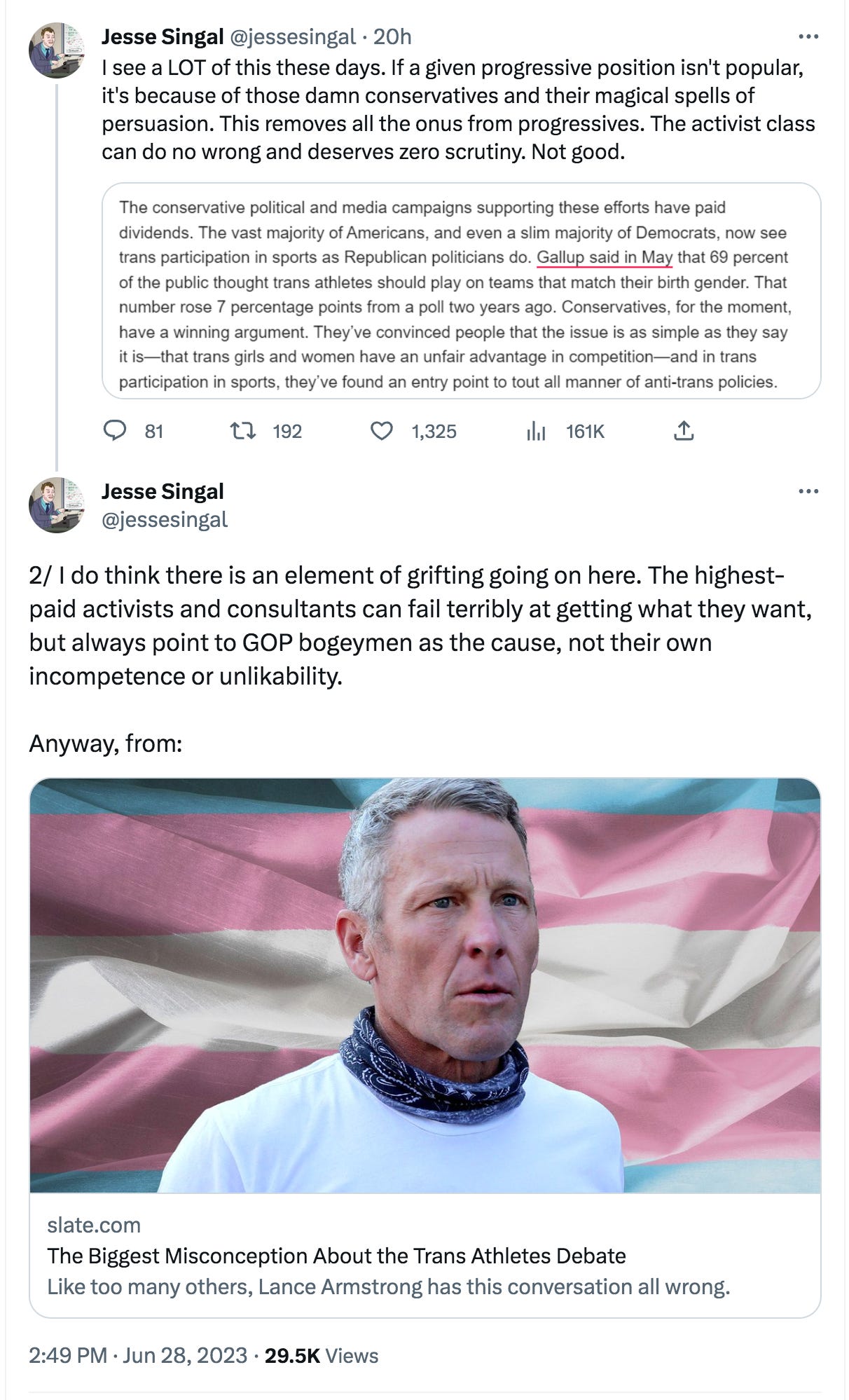E-Pluribus | June 29, 2023
Politics is always trying to bring art to heel; conservatism takes friendly fire; and transgenderism continues to undermine medicine.
A round-up of the latest and best writing and musings on the rise of illiberalism in the public discourse:
Pascal Bruckner: The Conquest of Art
“Politics is downstream of culture,” Andrew Breitbart said, but sometimes it feels like everything is downstream of a political river that’s bearing down like the Johnstown Flood. At City Journal, Pascal Bruckner explores how politics has infiltrated (or inundated) the art world at every level.
The totalitarians of the twentieth century distinguished themselves in their will to crush “decadent” art and promote the official art of the regime. National Socialism advanced the notion of “degenerate art,” which it opposed to heroic art, or racially inferior art as opposed to racially pure art. This idea of degeneracy was first applied to the plastic arts, with the banning of Oskar Kokoschka, Otto Dix, Max Beckmann, Marc Chagall, Picasso, and Kandinsky, all held to be filth. It was extended to the music of Schoenberg and Kurt Weill and to swing, as well as to the cinema of Max Ophuls, Fritz Lang, and Billy Wilder—and to literature, too, of course. The autos-da-fé proliferated, the most notorious taking place in 1933 in Berlin’s Opera Square, where more than 10,000 books (including works by Stefan Zweig, Freud, and Marx) were burned for expressing “Jewish negativism.”
[ . . . ]
And what of our democracies today?
“Cancel culture,” as it is called, deems it necessary to purge museums, libraries, and film collections, among other repositories of works, of politically insensitive material. Thirty years ago, American feminists, in an early expression of this pseudo-progressive impulse, castigated Picasso, Balthus, and other major artists for their supposed hatred of women, evident in their depictions of the female sex. That canceling impulse is pervasive today. Gauguin must be censored, writes Adele, a reader commenting on a review in the Guardian of the National Gallery’s 2019 exhibition devoted to the artist. She suggests that the organizers interest themselves in the “thousands of terrific artists,” often unknown, instead of this “pervert pedophile”—here, the artist’s behavior and not his art being the offending thing. She concludes, in an increasingly common gesture: “Come on we are in 2020, and we no longer promote abusers.” Indeed, Gauguin has the honor of fulfilling every category of abomination: he is at once a sexual malefactor, a racist, and a colonialist. For Adele and those like her, the standard for assessing a work of art no longer is its wealth of meaning or its formal inventiveness, but its conformity—or the artist’s conformity—to the progressive moral credo of the age.
[ . . . ]
Publishing houses in Britain and elsewhere are now hiring “sensitivity readers,” who decide whether a given passage of a manuscript will offend minority groups. It was this kind of process that led to the push to rewrite Dahl and Fleming. Literature becomes a book of grievances; no more development of a variety of characters.
And let us not neglect those new vandals, the Greens, who threw tomato soup on a van Gogh painting in October 2022 or tossed mashed potatoes on a Monet, gestures they take to be some kind of spectacular happening. The hatred of art, once distinctive of the Khmer Rouge, disguises itself behind the mask of climate concern.
These woke positions bear a striking resemblance to the teachings of Zhdanov, Stalin’s fellow-traveler from the 1930s, who defined socialist art as that which contributed to the ideological education of the masses. A pitiless censor, he attacked the decadence of bourgeois art and demanded that intellectuals, those “engineers of the soul,” do their part for the formation of the proletariat. Shostakovich and Prokofiev, accused of dissonance and atonality, were among his main targets.
Read it all.
Jonah Goldberg: Defending Conservatism—From the Right
At The Dispatch, Jonah Goldberg finds himself standing athwart history yelling, “Stop! And I mean all of you!” Goldberg writes that defending conservatism from outside criticism is par for the course, but conservatism is facing attacks from within as well.
As I’ve said many times, during the Trump years I’ve never felt more politically homeless or more ideologically grounded. I think a lot of people, particularly people who feel the same way, understand what I mean intuitively. But I’ve found a lot of people don’t. Let me explain for a moment. I feel like I’ve been freed from a level of partisanship I never fully appreciated in myself when I thought conservatism and Republican politics were more in sync and their interests more aligned. I’ve lost the sense of obligation or compulsion I once felt to defend Republican positions. I was never a hackish water-carrier for the GOP (opinions differ!) but I confess that sometimes I was too quick to assume that if progressives or Democrats angrily insisted that Republicans were wrong, there’s probably something right about what Republicans were doing. Or, conversely, that if Republicans were angry about something Democrats were doing I should defend that anger.
[ . . . ]
[J]ust as I was working on making that good faith argument to good faith progressive readers, a whole bunch of people on the right started rejecting liberal democratic capitalism—in whole or in part. Some just don’t like the liberalism but are okay with the democracy and capitalism. Some think the democracy part is negotiable but we should keep some of the other stuff. Some hate all three and think we’d be happier as serfs. It’s a hodgepodge.
It’s also mostly absurd. And, sometimes, depressing.
I think some questions should simply be settled. Close the books, lock the door, and worry about other things. Liberal democratic capitalism—broadly speaking—is one of them. Obviously, it’s an open question about where to circumscribe the free market. But on the issue of whether the free market is better at generating prosperity, that is a settled question for me. So are all sorts of liberal commitments—fair trials, individual rights (including property rights), freedom of religion, etc.—I think we’d be better off if these weren’t topics for serious debate in sort of the same way serious people don’t debate whether murder or genocide are wrong. And I certainly think these should be settled questions among conservatives. But they’re not.
Read the whole thing.
Roy Eappen and Ian Kingsbury: The Endocrine Society’s Dangerous Transgender Politicization
The Endocrine Society joins a growing list of scientific and medical organizations co-opted by politics. At the Wall Street Journal, Roy Eappen (a member of the Endocrine Society) and Ian Kingsbury expose how radical gender ideology is trumping fact-based (and common sense) standards.
[O]ver the past decade transgender activists have co-opted the Endocrine Society and other professional organizations to promote such treatments for adolescents and even young children. Their guidelines are based on flimsy evidence, giving the appearance that invasive and irreversible treatments are beneficial for young patients despite a growing body of evidence to the contrary. The guidelines have been used by lawmakers in states such as California and New York to endanger children—and now by judges to block state efforts at protecting youngsters.
[ . . . ]
At this year’s meeting, we had frank and fruitful discussions with endocrinologists who provide hormonal treatments to kids with gender dysphoria, as well as some who don’t. Without exception, they acknowledged that the society’s evidence base for pediatric gender transition is weak, at best. Yet while they’re aware of the guidelines’ shortcomings, they’re afraid to voice their concerns. The society’s full-throated endorsement of gender-affirming care implied condemnation of anyone who holds differing views. Medical professionals are being cowed into silence and coerced into providing treatments they know are dangerous to children.
Perhaps the most telling interactions were with European endocrinologists, who were there to discuss the latest research and treatments in the specialty. Those we spoke with expressed surprise that the U.S. hasn’t banned, or at least severely restricted, such treatments for adolescents and children.
[ . . . ]
Most disturbing, endocrinologists on all sides of this debate told us that practitioners aren’t complying with the precautions set forth in the society’s guidelines. Despite the document’s call for careful mental-health screening and its acknowledgment that most cases of childhood gender dysphoria naturally resolve during puberty, endocrinologists recognize that some of their peers are rushing young patients to irreversible hormonal treatments. Every endocrinologist we spoke with supports doing more to ensure that these guardrails are enforced, and many favor erecting new ones.
Read it all here.
Around Twitter
The Washington Free Beacon’s Aaron Sibarium reports that Stanford Law’s follow up to the shout down of federal judge Kyle Duncan has been less than ideal. Thread excerpts below.
Jesse Singal comments on the virtual get-out-of-jail-free card for progressive positions:
And finally, from Justice Roberts’s opinion today striking down affirmative action:










